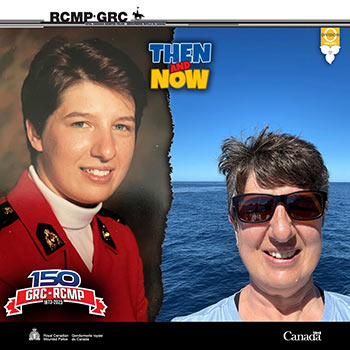RCMP150 O Division employees reflect on their service - Sgt. Paulette Breau (retired)
In this Q&A, retired Sergeant Paulette Breau (#39286) helps to mark RCMP’s 150th anniversary by sharing some of her experiences as a police officer for the RCMP and instructor at the Ontario Police College (OPC). Her career spanned 30 years, from graduating (Troop 18) in 1987 to retirement in 2017.
Tell me a little about your career?
I was fortunate enough to spend my career in O Division (Ontario) or National Capital Region (NCR) with a focus on Federal Policing and Training & Development. I spent many years working in the Drugs Section, in undercover operations. I have also worked in Federal Enforcement, Commercial Crime and Criminal Operations.
From there I went to O Division HQ Training Branch followed by National HQ Training & Development Branch. I became a Use of Force instructor for O Division, which was unique as almost all instructors were male. After that I taught on the National Use of Force training where I trained members to become Use of Force instructors for their respective divisions. I believe I was the first female to teach at the national level so this opened the door for other female members to teach as well.
I finished my career as an instructor at Ontario Police College, teaching Federal Statutes to all of the recruits for Ontario police services.
Were there any members or employees that made a positive difference in your service?

Sgt. Paulette Breau (retired)
I was blessed to have many members who inspired me throughout my career. The first was Cst. John (Albert) Martin who was stationed in my hometown. Long before I became a member, he would bring me into the detachment and show me training videos to help me prepare for Depot.
Then at my first detachment Sgt. Don Oesch became like a dad to me. At first, he wasn’t sure about having a female member in his drug squad, but later on, he had so much trust in me that he co-signed for my mortgage!
My third mentor was my supervisor, Sgt Gerry Melinko. who was always encouraging and was a great team leader.
Others who inspired me were Sgt. Bill MacDonald, Training Branch and S/Sgt. Brad Keddy who was my boss while working in Hamilton Commercial Crime Section.
All of these mentors were kind, supportive and knowledgeable in their areas of expertise. They, along with others, contributed to the success of my personal and professional growth as a police officer.
Describe the proudest, scariest or hardest moment in your service.
My scariest was while working as an undercover drug operator. I was tasked with trying to buy cocaine from a known drug dealer. It was also known that this drug dealer owned a handgun. After entering the apartment, the dealer drew his handgun, my partner and I jumped the suspect and took him to the floor. We removed the weapon and took him into custody. There was no doubt that the suspect intended to use his weapon on us.
This taught me to always be aware, to be vigilant and to be prepared to make those split-second decisions.
I would say that the hardest moment in my career was when I had to come to terms with my post-traumatic stress disorder (PTSD) which wouldn’t allow me to finish my time at the OPC. My PTSD forced me to take a medical discharge from the RCMP 2017.
Thinking back, after all your experiences, if you could give your “depot or training academy self” one piece of advice to help you in your future career, what would it be?
Develop a work-life balance! The job became my life and I never learned to say “no” to overtime or additional tasks. I was willing to do whatever it took to do the job and more.
I would tell my “depot self” to learn about and take advantage of all the tools and resources that are available to ensure that you stay healthy (i.e. psychological services, massage therapy, peer support, exercise etc.).
Do you feel that you were negatively affected, either directly or indirectly, by the culture of policing? Explain.
Being a female member in the 1980’s was not always easy; I was not always accepted as a regular member by some of the male members in the Force. I recall being told that I don’t belong as a police officer and that instead I should be "at home, barefoot and pregnant."
Although there were harassment issues throughout my service, it did not affect how I felt about my service. And, I am happy to tell you that there was significant positive change for women within the Force by the time I retired.
I was, and still am, proud to have served Canadians and proud of the positive contributions that I made to RCMP.
Since your retirement, do you feel it is important to stay connected to the RCMP? If so, how have you remained connected?
Upon my retirement, I was granted the opportunity to retain my red serge. I do public speaking engagements about the RCMP to community and service clubs and attend Remembrance Day services in my uniform.
I continue to stay in touch with members and employees of the RCMP, many of whom I consider lifelong friends. I also keep in touch through RCMP groups on social media.
- Date modified: